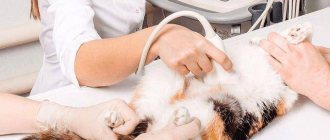It is not for nothing that sterilization of cats is considered one of the most typical operations: it is relatively simple and well studied, the likelihood of unpleasant “surprises” is minimal. However, in practice anything can happen. It happens that a cat screams like crazy after sterilization, driving its owner into panic. What does this indicate and how dangerous is this phenomenon?
What operation was performed?
To find out why a cat screams after sterilization, you need to figure out what kind of operation was performed at the veterinary clinic. There are two types of procedures: castration and sterilization. These two procedures are different from each other. In the first case, the ovaries are ligated or the uterus is removed, but the ovaries are not touched. With this operation, estrus continues, but there cannot be kittens . The animal's hormonal levels subsequently become unstable and even in rare cases pregnancy is possible.
Castration involves the removal of both the uterus and ovaries. In this case, estrus stops and the hormonal background after such an operation is more stable, since the adrenal glands are responsible for the production of hormones.
Hormones
Sterilization does not disrupt hormone production. For this reason, the cat may go into sexual heat. The instinct to reproduce does not disappear, so the animal may go into heat. It is accompanied by changes in the behavior of the pet.
Read also: Why “Katyusha”
A cat can be in heat even after spaying, because... The ability to produce the necessary hormones is retained by the adrenal glands and the pituitary gland. For this reason, the operation is recommended to be performed at 6 months, i.e. before the onset of the first sexual heat.
To normalize the state of health, the cat is prescribed hormonal medications.
Consequences of sterilization
If the first operation was performed on the furry purr, then it is clear why the sterilized cat screams. The instincts remain the same. In general, the sterilization procedure is regarded by many veterinarians as abuse of animals. After all, with such an operation, the owner dooms the pet to lifelong torment. The sexual instinct will manifest itself every time, but the maternal instinct will never be satisfied . This will only cause the animal to suffer. In this case, the pet will experience hormonal explosions throughout its life, and concerts at home are inevitable.
© shutterstock
Signs that a cat needs a cat
The animal starts screaming very loudly all day long, so you won’t confuse this fact with anything. Signs of heat:
Loud screams. The first time it will be strange, but the next time you will immediately understand what is going on
The pet meows very loudly and thereby attracts attention. This is a natural instinct;
Appearance of marks
It is not clear whether she does this on purpose, since during this period she experiences heavy discharge; Constantly crawls underfoot, rubs and bends; A decrease in appetite is also characteristic of this period; Increased urination;
Complications during castration
If a castration operation was performed, and the cat screams at night, then, most likely, the procedure was accompanied by complications. Let's consider all the options:
- It is possible that the operation was performed during estrus. Then for some time after sterilization of the cat, instinctive behavior will be observed, as with sexual desire. She will meow and ask for the cat. It is necessary to wait for the restoration of hormonal levels (this period is about 3-4 months) and observe the behavior of the animal.
- If the operation was carried out before the first heat, and the sterilized cat periodically screams, then, for sure, it was performed poorly. Perhaps some of the ovaries remained unremoved. This affects hormonal levels. Therefore, the sexual instinct continues to work. This option is easy to check. If the furry purr is helped by drops and pills, such as “Sex Barrier,” then the operation was poorly done. You should contact a veterinary clinic, be sure to do an ultrasound of the ovaries and, subsequently, sterilize again.
- There is an option that the operation was performed efficiently, but late (at the age of 3-5 years). In this case, the animal’s behavior does not change, and the cat yells for no reason at night out of habit. In this case, she does not have hormonal surges, and her behavior imitates pre-operative behavior.
- It happens that such behavior can be a signal for the owner about problems in the health of the furry pet. In particular, a cat may yell periodically if its adrenal glands are bothering it.
Veterinarian advice
Some veterinarians consider it inappropriate to sterilize a cat, which involves tying the fallopian tubes. After the operation, the animal continues to lead its usual lifestyle, so there is still a possibility of developing other health problems characteristic of pets who have not undergone surgery:
- inflammation of the uterus and appendages;
- cystic endometrial hyperplasia;
- infections transmitted through sexual contact;
- benign and malignant neoplasms, etc.
Estrus in sterilized cats may last longer than in unoperated cats, because fertilization does not occur. The possibility of a false pregnancy cannot be ruled out. This process is caused by a violation of the animal’s neuropsychic state. If a false pregnancy occurs, the cat's life is at risk if treatment is not started in a timely manner. The animal begins to produce milk, which is dangerous for the development of mastitis. False pregnancy can occur repeatedly.
Before getting a female pet, you need to think in advance about all possible problems and difficulties that may arise in the future, including deciding on sterilization. If in doubt, it is best to consult a veterinarian.
What measures to take?
What to do in such a situation? And should you pay attention to your pet’s behavior? The answer is clear - it is necessary. If you let the situation take its course, then the sterilized pet’s cycle may be restored and such behavior will be regular. If the problem is not the quality of the operation, then veterinarians recommend medical intervention - it is necessary to inject the cat with a hormonal vaccine, such as Covinan or depot-gestone. This may need to be done twice. In any case, it is advisable to do this only after the recommendation of a veterinarian.
Features of animal behavior
Sexual heat is accompanied by a change in the character of the pet. If a cat asks for a male after sterilization, her need for mating manifests itself as follows:
- The animal begins to meow loudly and hoarsely.
- The female suddenly becomes restless.
- She's marking her territory.
Sometimes this behavior persists in the pet for the rest of its life, despite surgical intervention. Fortunately, the discharge of sterilized animals does not have a pronounced odor.
Stress factor
Wait. Let's try to understand the problem. Remember, was there a situation at home that could affect the cat? Maybe friends with a dog came to visit? Or did little guests come to the children who wanted to meet the beautiful purr? Or did your pet’s food suddenly change?
It would seem that these are very minor factors. This is real stress for you and me, but for the cat. Imagine, she lies there, not bothering anyone. And then a dog’s face came out of nowhere. And he smiles from the top of his dog’s mouth. Naturally, the cat’s eyes will widen, as they say, and it will start looking for the fifth corner in the apartment, just to escape from the monster. And then the body “discharges” in such a non-standard way as marking the territory. Because he was stressed.
We suggest you read: Feeding one-month-old chicks, what to consider at this age
Persistence of other behavioral traits that should have gone away
Each owner, when sending a cat for sterilization, pursues a specific goal. Such a goal could be:
- cessation of estrus;
- the cat stops yelling all day long;
- The cat stops marking its territory.
In some cases, this behavior may continue to manifest itself in pets.
For example, immediately after surgery, an animal may scream for a couple of months, since there are still “wandering” hormones in the body.
They can cause continued estrus for a short period of time after removal of the ovaries.
If the cat continues to scream, the type of surgery performed should be considered. For example, after the fallopian tubes are pulled, the female loses the opportunity to become pregnant, but the ovaries continue to produce hormones, and accordingly, the cat continues to scream. It is also worth making sure that the operation was successful.
Attention!
You just need to wait out the two-month period after sterilization - no need to give your cat pills that suppress estrus or panic. If the cat asks for a cat after 2 months after surgery, contact your veterinarian.
Intestinal helminths
"Concerts" may be due to helminthiasis . Acute obstruction, pain and colic in the intestines accompany the active activity of parasites. After two years of life, preventive treatment should be regular. A constant feeling of hunger makes the cat wake up its owner even at night.
If the animal begins to scream, it must be examined. Feel carefully, if the cause of the cries of pain is in the abdomen, then increased discomfort will cause the cat to break out. There is no need to delay, you need to urgently take your pet to the doctor. The causes of pain can be very serious, and the consequences of negligence can be catastrophic.
Time cures
This is some consolation for owners who are tired of dealing with a similar problem. Not immediately, after a certain time, but castration of the cat should still bring a positive result. Reviews from doctors indicate that hormonal changes in adult animals take quite a lot of time. Therefore, for several months the body will work in its usual mode, slowly moving onto new tracks.
No, he will not be oppressed and tormented by the thought that he will no longer be able to have offspring. In animals this issue is much easier to solve. Since there is no longer a need, the individual does not experience any worries about this. By the way, if you ask a veterinarian about why to castrate a cat, he will answer you that way. So that he lives in peace and gives to you.
Disease
The cat marks as if to spite its owner. They did everything to her: they scolded her, spanked her, and poked her nose. No, he doesn't understand. Runs away from the crime scene on half-bent legs, with blocked ears. But he continues to do his job.
We invite you to read: Overcome mice and rats? 8 breeds of real rat-catching cats that will destroy rodents
Do not rush to scold your favorite. Perhaps the whole point is that the animal simply does not always have time to reach the tray. If a cat has cystitis or urolithiasis, punishment will not help. The animal must be treated; this is impossible to do at home. Therefore, you will have to take your pet, put it in a carrier and rush to the veterinarian. The faster, the better for everyone. Because only a specialist can determine the presence of diseases associated with the bladder.
Health
Regardless of your cat's age, howling at night can be a sign that something is wrong and your pet is not feeling well.
If it is not clear what exactly is the reason for this behavior, you should immediately take your pet to a veterinarian. If the issue is health, then the problem should be quickly detected and corrected by a specialist. Note that howling most often indicates problems with the thyroid gland, hypertension, etc. The doctor will take blood and urine tests, which will allow you to accurately determine the problem and prescribe appropriate treatment.
Based on materials from: pets.thenest.com
Heredity
A similar pathology forms in an animal even when it is in the womb.
Scientists call it ectopic ovarian tissue syndrome.
The problem is that during the formation of the ovaries, some tissue cells end up in another part of the animal’s body, and it is simply impossible to identify them in the formed and strengthened cat’s body.
Reference!
Such a hereditary predisposition is very rare.
The main causes of post-operative screams
The reasons are not too varied:
- Postoperative inflammation. They arise either as a result of gross violations of the rules of asepsis and antisepsis at the time of the operation, or due to the cat licking the surgical sutures, as well as scratching them. In this case, the cat screams in pain.
- Formation of postoperative hernia. It is also an unpleasant phenomenon that may be accompanied by pain and other unpleasant sensations.
- It is not good when a cat meows after sterilization, and its voice is too weak. In some cases, this behavior indicates the presence of internal bleeding. If your pet's skin and mucous membranes become uncomfortably cold, this should be reported to your veterinarian immediately.
- Fever. It happens that in some cases the operated cat’s body temperature jumps, and this is not a pathology. But in other cases, this indicates the penetration of pathogenic microflora into the animal’s body.
Sterilization took place a long time ago, but your pet is screaming as if she’s in heat?
It also happens that the operation took place a long time ago, but the cat still screams as if in heat. What is the reason for this phenomenon? It's simple. Even if the animal’s ovaries have been removed, some of the hormones are still retained in the body. A lot of time passes until their reserves are finally exhausted. Until then, the cat will constantly yell, demanding the attention of cats. Most likely, you will have to wait at least three or four months for the end of this “concert.”
Attention! If the operated cat has all the signs of estrus, she screams and even follows the owner’s heels, in no case should you use medications like “Sex Barrier” and other hormonal drugs!
Failure to comply with this recommendation leads to the development of severe hormonal pathologies. If you use these drugs for too long, even the development of cancer becomes quite possible.











